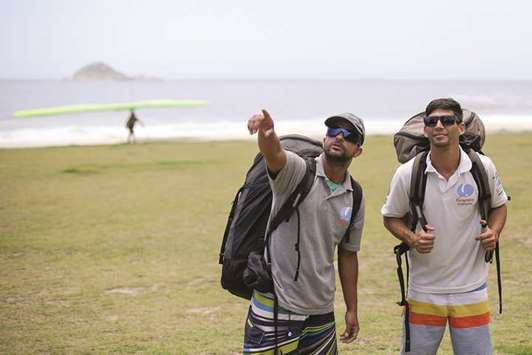Rocinha, a sprawling Rio de Janeiro slum that’s best known for its turf wars between drug traffickers, does not seem a likely place to find paragliders.
But that’s exactly what Rocinha-born Wellison de Souza and Rodolfo Pascoal do, literally soaring above the violence that consumes their slum, or “favela,” that is home to about 70,000 people.
De Souza, 32, has taught paragliding in Brazil’s second-largest city for four years and has been flying for a decade.
Drug trafficking was never a part of his life, the Rocinho resident says, because he always shunned those circles.
Pascoal, 35, also says the “traffic” was never a temptation for him, because people like de Souza and himself “grew up working” since they were young boys.
The paragliding school where they work is located in the Sao Conrado neighbourhood, about 2 kilometres from Rocinha, opposite a beach where de Souza used to practise surfing.
“A surfer friend who also did paragliding invited me to fly, but I did not have the courage, I was afraid. Until he persuaded me,” de Souza says. He liked the sport so much that he took a course to become a teacher, financing it with savings and help from friends.
Pascoal formerly worked as a motorcycle taxi driver in Rocinha. Then, “14 years ago, a friend who was a paragliding teacher got me a job folding parachutes at the school.” Pascoal, who admits that he was also afraid of flying, took his first course in 2009.
The two men of humble origin are teaching an expensive sport, but such contrasts do not surprise anyone in Rocinha, which lies right next to the mansions of Sao Conrado.
Many of the tourists whom the two teach are interested in visiting Rocinha, and Pascoal and de Souza offer them the opportunity.
However, Pascoal stresses, visitors need to enter with caution, because “you need to know how to live in Rocinha.”
Slums in Rio de Janeiro usually have a ruler, who can be a drug trafficker or militia chief, and who offers security to residents he extorts money from.
“You need to have eyes and not see; have a mouth and be mute; and have ears but be deaf,” Pascoal says.
The paragliding teachers say they’ve lost count of how many friends or acquaintances have been killed during clashes between drug traffickers, or between the dealers and police.
When a turf war erupted in September, it was “a chaos of shoot-outs. It was complicated for those of us who live here,” de Souza says.
Many tourists cancelled their paragliding appointments that month.
“We could not fly near the community, because there were a lot of gunfire,” Pascoal recalls.
In response, the government sent 950 soldiers to patrol Rocinha for a week in late September.
But potential visitors were further discouraged by the killing of a Spanish tourist by police officers who fired at her vehicle in October.
Despite such problems, Pascoal and de Souza, as well as eight other paragliding teachers who live in Rocinha, do not want to leave the neighbourhood.
The two say they have a sense of belonging to the favela, where they grew up and where their families live.
And if they feel like escaping, they always have the option of experiencing what they call “the beautiful contradiction” of seeing the slum from high above, in the embrace of the breath-taking landscape that surrounds it. – DPA

PARA-GLIDERS: Rodolfo Pascoal, left, and Wellison de Souza were born and live in the Brazilian favela of Rocinha.
